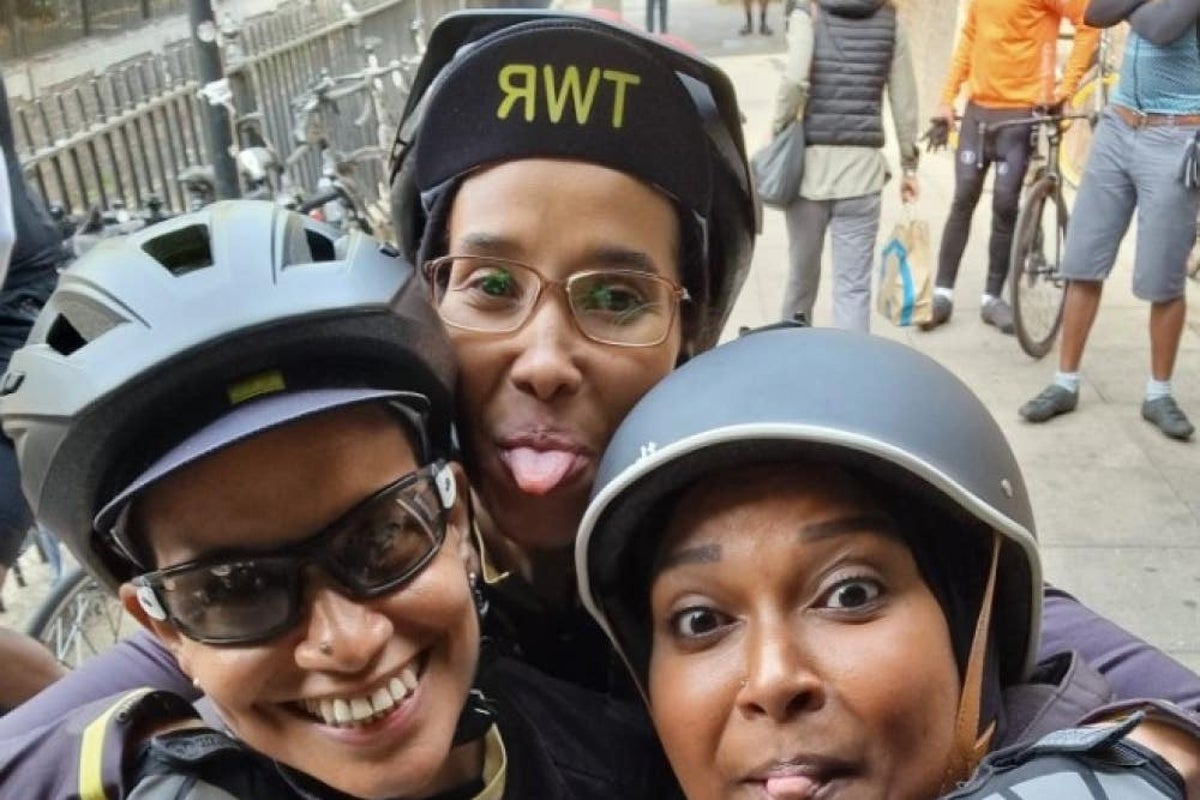
Three avid cyclists have described the “big emphasis on joy” within their cycling collective after its second annual Black History Month bike ride.
The 22-mile ride across central London was organised by the team at Together We Ride (TWR), a black-led collective aiming to empower people through cycling, as well as to “uplift” one another and bring more people into the sport.
Nevin Sunderji, Kamar Omar and Mona Musa-Gray all joined the group of over 60 who biked through the city on Sunday, stopping at 10 of the capital’s blue plaques and monuments commemorating black people to talk about their stories.
Starting in London Bridge, their stops included Bob Marley’s house on Oakley Street in Chelsea, a booksellers which published the first work of a black female writer in English, Phillis Wheatley, in Aldgate, and the Gilt of Cain sculpture commemorating the abolition of the slave trade in the City’s Fen Court.
“As a group, as black people visiting these monuments, it gives us a sense of belonging,” Ms Sunderji, a 56-year-old cycle instructor and business travel consultant from Hounslow, told the PA news agency.
“Knowing that they were there way before, but it’s not taught in our history classes over here in the UK… We’re made out to be like, all black people were slaves – it’s very degrading, everything is sad and poor.
“And then no, it wasn’t like that. We’ve lived lives, we’ve had our riches, we’ve got doctors, neurologists, many people that are high up and it’s never been celebrated properly in the UK.
“So it was very, very moving and joyful, some of it was a bit sad… But it’s pride, huge pride.”
Ms Musa-Gray works for Black Unity Bike Ride, a series of “activations” that encourage wellness amongst the black community, and which consists of over 20 black-led cycling collectives.
She described the bike tour as “an importance space” for black people to come together, but also touched on the “sad reality” of the history behind many of the monuments.
“When we visit these different sites and we see the breadth with which these different people, from artists, politicians, to people influencing civil rights and doctors… It was just such a wide variety of people and skill,” the 38-year-old told PA.
“At some point it’s for us to try to honour what we can, but it does definitely bring back that sense of belonging.
“And unfortunately, I have to also say it for me personally, it reminds me of degradation with which we’ve had to endure and lift through and the denial of our freedom and the denial of our excellence.”
Ms Musa-Gray also said the ride and being part of TWR enables the group to “spread the love.”
“It’s very important for us to be able to have spaces where we can come together,” she said.
“We don’t exclude anybody, we’ve got people of all different backgrounds and hues joining us, but I feel like having black-led or black-owned clubs, is very important for us to continue thriving within cycling.
“And when you are with a bunch of people who are loud, boisterous, just want to break out into song… You just do it and you don’t feel like, ‘Oh, they’re looking at me like I’m insane.’
“It’s that holding space for each other… It’s a cycling club but there’s a big emphasis on joy.”
It was the first TWR cycle for Ms Omar, a 33-year-old teaching assistant at a primary school from Wandsworth, who said it was “amazing” to be part of the Black History Month bike ride.
“I absolutely loved it, it just felt so welcoming,” she said.
“And everybody seemed so happy.
“I just feel like Black History Month should be celebrated all year round.”
Ms Omar said it was “so interesting” for the group to learn about “who these people were and what they went through”.
“They have been through a lot and not everybody knows the actual history,” she said.
“And so when some of the lovely riders that were with us were reading through the actual history, it was so interesting.
“And it’s got me to go back and learn a bit more about our history.”
Ms Sunderji added that while the tour could have worked for runners or walkers as well, cycling is “a different feeling”.
“We are a family that loves to be on two wheels, I think it just (has) that extra element of freedom,” she said.
“When I’m on my bike, I feel so liberated.
“You’re up there, and you’re just flying.”







